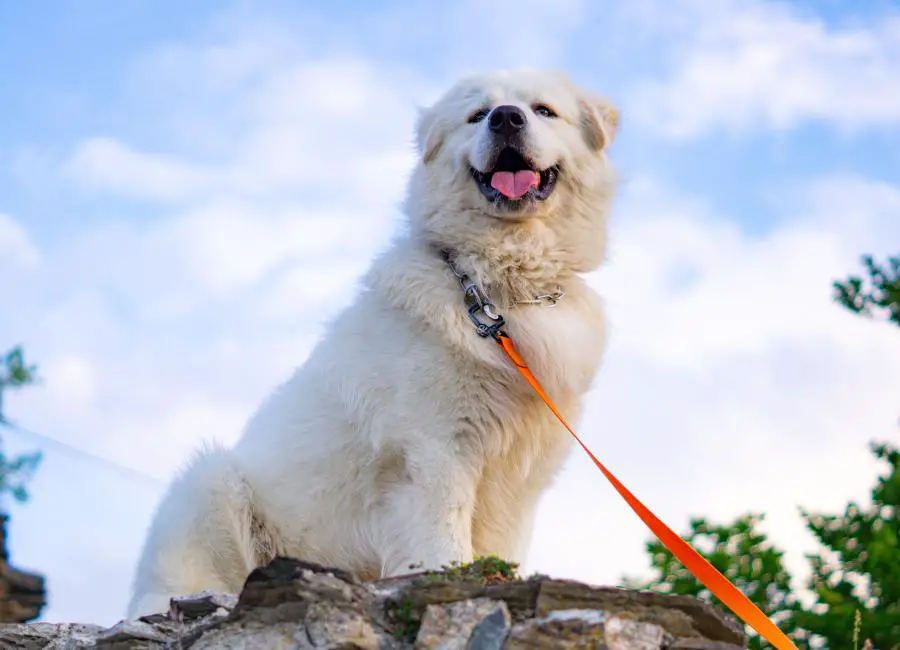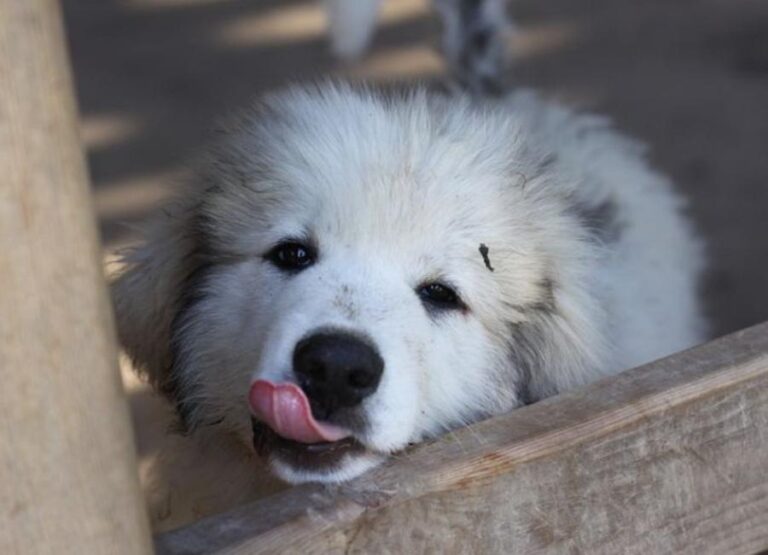11 Common Great Pyrenees Behavior Problems With Solutions

In this blog post, we will explore some common Great Pyrenees behavior problems and provide practical tips and advice to help you overcome them.
Are you a proud owner of a Great Pyrenees but struggling with some behavior problems? Don’t worry, you’re not alone.
Many Great Pyrenees owners face similar challenges with their furry friend’s behavior, such as excessive barking, digging, and jumping.
But the good news is that these problems can often be addressed with the right training and techniques.
Causes of Great Pyrenees Behavior Problems
Before we proceed to some of the most common Great Pyrenees behavior problems, let’s first outline the causes.
Great Pyrenees behavior problems can be caused by a variety of factors.
One common issue is a lack of early socialization, boredom, or lack of exercise.
Another genetic predisposition issue of stubbornness or uncooperativeness.
Great Pyrenees may also have a tendency to wander or explore, which can lead to frustration and aggression if not properly managed.
Proper training and exercise from an early age can help prevent and manage these problems.
Great Pyrenees Behavior Problems
Great Pyrenees dogs can have several behavior problems, including refusing to come when called, destructiveness, separation anxiety, pulling on the leash, and stubbornness.
They can also be stubborn and uncooperative and may ignore their owners.
It is important to properly train and socialize Great Pyrenees dogs to prevent aggression and territorial behavior.
Let’s look at the most common Great Pyrenees behavior problems with each of their solutions.
Here are some of the most common Great Pyrenees behavior problems and how to resolve or prevent them:
1. Pulling on the leash when walking
Strong dogs like Great Pyrenees may tug on the leash when being walked, which can be challenging for their owners to manage.
Your Great Pyrenees needs to be taught to stroll gently on a leash from an early age if you want to prevent leash tugging.
Another way to manage their tugging habit is by using a front-clip harness or head collar.
Employ tactics for positive reinforcement to encourage them to walk gently, such as giving them food or compliments.
2. Destructive chewing when bored
Great Pyrenees need to chew on items to relax because they are active dogs.
When they chew on your furniture or shoes while you are not home, though, this habit may be damaging.
Giving them a lot of chew toys, such as Kongs or Nylabones, can help control their destructive chewing behavior.
Increasing their playtime and exercise can also help them feel less stressed and stop them from gnawing at inappropriate objects.
3. Aggression towards strangers or other animals
Being recognized for their protective nature, Great Pyrenees can be aggressive against outsiders, especially if they feel threatened by them or their families.
Your Great Pyrenees must be socialized from an early age in order to stop this habit.
To assist them understand that not everyone is a threat, expose them to fresh individuals and situations on a regular basis.
It’s also crucial to watch your dog with unfamiliar individuals and never leave them unattended with young children.
4. Separation Anxiety when left alone for too long
When left alone for an extended period of time, Great Pyrenees may develop anxiety or act destructively since they thrive on human company.
Destructive behavior, incessant barking, and restlessness are examples of separation anxiety symptoms in the Great Pyrenees.
Your Great Pyrenees will not have separation anxiety if you gradually introduce them to being alone and provide them with lots of mental stimulation, such as puzzle toys or treat-dispensing balls.
To make your Great Pyrenees feel safer from separation anxiety, you can also leave a piece of clothing with your fragrance on it.
Learn more about Great Pyrenees Separation Anxiety.
5. Excessive barking when they feel bored or lonely
Great Pyrenees are vocal dogs who occasionally bark excessively, particularly if they’re bored or lonely.
It’s critical to give them a lot of exercises and mental stimulation to stop excessive barking.
They can be kept entertained and prevent boredom through regular walks, playtime, and interactive toys.
Also, you can teach them not to bark when asked by rewarding them when they do.
6. Excessive digging when they feel bored or lonely
Great Pyrenees may dig in the yard or garden, especially if they are bored or not getting enough exercise.
Although this activity is normal, if they dig up your yard or garden, it could be a problem.
Giving them a specific digging environment, like a sandbox or dirt pile, can aid in rerouting their activity.
Alternately, increasing the time spent playing and exercising can aid in lessening their desire to dig.
7. Jumping on people when overly excited
Great Pyrenees are large dogs, and because of their size and potential for intimidation, they may jump up on humans and furniture, especially when they are aroused.
Jumping can be avoided by teaching them appropriate greeting behaviors, such as sitting or being still.
Also, you can teach them to welcome guests in a particular space, such as the entryway or mudroom.
Instruct them to sit or lie down when introducing themselves, and praise them for being composed.
Also, giving them a ton of fun and exercise can aid in lowering their excessive energy and jumping.
8. Dominance issue
Conflicts and other behavioral issues may result from Great Pyrenees trying to show dominance over their owners or other household canines.
It’s critical to establish yourself as the pack leader from an early age in order to stop domineering behaviors.
To train your Great Pyrenees, use positive reinforcement methods and establish firm boundaries and standards.
9. Not listening to commands
Due to their independence, Great Pyrenees are not always obedient to directions, particularly if they are distracted or bored.
Consistent training and the use of positive reinforcement methods are key to increasing their obedience.
Treats, compliments, and playtime can be used to reinforce training and develop a child’s listening abilities.
To avoid boredom and lack of interest, it’s crucial to keep training sessions brief and interesting.
10. Try to escape when bored
Due to their independence, Great Pyrenees dogs may try to run away, especially if they are not receiving enough mental or physical stimulation.
Giving your Great Pyrenees frequent exercise and playing will help avoid elopement.
Make sure your yard is completely fenced in and that your dog cannot escape through any openings or holes.
If your Great Pyrenees manages to escape again, it could be important to keep an eye on them while they’re outside or to tether or tie them up.
11. Food aggression
When it comes to food, Great Pyrenees can become aggressive, especially if they have to compete with other dogs in the home.
It’s crucial to feed your Great Pyrenees in a calm, peaceful setting and to watch them eat in order to prevent food aggression.
If you have numerous dogs in the house, it can also be necessary to feed them separately.
Frequently Asked Questions
What are some common behavior problems in Great Pyrenees?
Great Pyrenees dogs are known to bark frequently, especially when left alone for long periods of time. They can also be quite territorial and may exhibit aggressive behavior towards strangers or other animals.
Can Great Pyrenees be trained to overcome behavior problems?
Yes, proper training and socialization starting at a young age can help Great Pyrenees overcome behavior problems.
Consistent training and positive reinforcement can help reduce excessive barking and aggressive behavior.
Are Great Pyrenees good with children?
Great Pyrenees are known for their patient and gentle nature, making them excellent family pets.
However, they may not be the best choice for families with young children as they are large and can unintentionally knock over small children.
How much exercise does a Great Pyrenees need to prevent behavior problems?
Great Pyrenees require moderate exercise and plenty of opportunities to roam and explore.
Regular exercise and mental stimulation can help prevent behavior problems such as excessive barking and destructive chewing.
Do Great Pyrenees have separation anxiety?
Yes, Great Pyrenees are prone to separation anxiety, which can cause them to become destructive or engage in excessive barking.
Proper training and providing plenty of mental stimulation when left alone can help prevent separation anxiety.
Can Great Pyrenees be trained to get along with other pets?
Yes, Great Pyrenees can be trained to get along with other pets in the household.
Proper socialization and training from a young age can help prevent aggressive behavior toward other animals.
However, the Great Pyrenees may have a strong instinct to protect their territory, which can lead to territorial behavior.
Conclusion
In conclusion, Great Pyrenees behavior issues might be difficult, but they are solvable with persistence, consistency, and the right training.
Don’t forget to position yourself as the pack leader, offer lots of physical activity and cerebral stimulation, and deal with any problems as they come up.
You can have a joyful and peaceful connection with your furry pet for many years to come if you keep these suggestions in mind.



![Understanding Play Aggression in Dogs [Signs, Causes & Fix] Play Aggression in Dogs](https://petcreeks.com/wp-content/uploads/2023/10/pexels-павел-гавриков-8716315.jpg)


